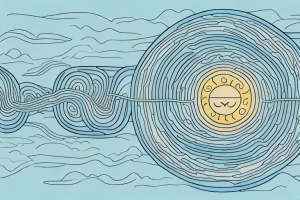Why it’s important to explore happiness at different ages
Understanding happiness is a complex endeavor that requires exploring its relationship with age. As humans, we go through different stages of life, each with its unique challenges and joys. By examining how happiness manifests at various ages, we can gain valuable insights into the factors that contribute to well-being and how they evolve over time. This exploration helps us develop a more nuanced understanding of happiness, promoting personal growth and societal well-being.
One important aspect of exploring happiness at different ages is the recognition that happiness is not a static state. It is a dynamic and ever-changing experience that can be influenced by a multitude of factors. For example, the things that bring happiness to a person in their teenage years may be vastly different from what brings happiness in their middle age or retirement years.
The correlation between age and happiness: Exploring the research
Extensive research has sought to uncover the correlation between age and happiness. While there may not be a definitive answer to which age is the happiest, studies consistently reveal intriguing patterns. For instance, studies often indicate a U-shaped pattern of happiness over the lifespan. Happiness tends to be high in our youth, declines during midlife, and then rises again in old age. These findings challenge common assumptions that happiness reaches its peak in certain age groups, highlighting the dynamic nature of well-being.
Furthermore, research suggests that happiness is influenced by various factors that change over time. For example, in youth, factors such as vitality, exploration, and novelty-seeking contribute to happiness. In later stages of life, relationships, meaning, and life satisfaction become prominent. This interplay between age and different aspects of happiness underscores the need for a holistic approach to understanding well-being.
Moreover, recent studies have also explored the role of societal and cultural factors in the correlation between age and happiness. Research has shown that cultural norms and expectations can significantly impact an individual’s well-being at different stages of life. For instance, in cultures that prioritize family and community ties, older adults may experience higher levels of happiness due to the support and social connections they receive. On the other hand, in societies that emphasize individual achievement and youthfulness, younger individuals may feel more pressure to conform to certain standards of success, potentially affecting their happiness.
Additionally, emerging research has started to investigate the influence of technological advancements on the relationship between age and happiness. With the rise of digital technologies, older adults are increasingly engaging in activities such as social media use, online learning, and virtual communication. These technological opportunities can enhance social connections, provide access to information and resources, and contribute to overall well-being in later life. Understanding the interplay between age, technology, and happiness is crucial in adapting policies and interventions to promote positive aging experiences in an increasingly digital world.
Unveiling the myths: Debunking common misconceptions about happiness and age
There are several misconceptions surrounding happiness and age that need to be addressed. One common myth is that childhood is the happiest time of life. While childhood indeed has its moments of bliss, it is important to recognize that happiness is not solely determined by age. Each stage of life presents its own unique circumstances that influence subjective experiences of happiness. Therefore, it is crucial to consider the complexity and diversity of happiness across different ages.
Another misconception about happiness and age is that older adults are inherently less happy than younger adults. While it is true that older adults may face certain challenges such as declining health or loss of loved ones, research has shown that overall life satisfaction tends to increase with age. Older adults often have a greater sense of wisdom, gratitude, and acceptance, which can contribute to their overall happiness.
Furthermore, it is important to note that happiness is a subjective experience that can vary greatly from person to person. Factors such as personality traits, life circumstances, and individual values play a significant role in determining one’s happiness, regardless of age. It is crucial to avoid generalizations and recognize the individuality of happiness experiences across different age groups.
Childhood bliss: Is youth truly the happiest time?
Childhood is often portrayed as a carefree and joyful period in life. Indeed, children possess a natural curiosity and enthusiasm that can enhance their happiness. However, it is essential to acknowledge that childhood also comes with its challenges. Children may experience stressors such as peer pressure, academic expectations, and familial conflicts. Additionally, the limited autonomy and dependence on adults can impact their overall well-being. While childhood can be a time of happiness, it is not devoid of struggles and should not be idealized as the epitome of happiness.
Adolescence and the pursuit of happiness: Navigating the challenges of growing up
Adolescence is a transformative period characterized by rapid physical, emotional, and social growth. While it is often associated with feelings of freedom and excitement, it is also a time of heightened vulnerability. Adolescents face unique challenges, including identity exploration, peer pressure, and academic stress. These factors can significantly impact their happiness and well-being. It is essential to support adolescents in navigating the complexities of this stage and provide them with the tools to cultivate happiness amidst the challenges they face.
The golden years: Does happiness peak in old age?
Old age often brings the assumption that happiness reaches its pinnacle. While research suggests that happiness tends to increase in later life, it is crucial to recognize the diversity of experiences among older adults. Factors such as health, social support, financial stability, and access to resources significantly influence happiness in old age. Additionally, the process of aging itself presents unique challenges, such as loss of loved ones and declining physical abilities. Therefore, it is important to avoid generalizations and understand that happiness in old age is shaped by a multitude of factors.
The role of life experiences in shaping happiness across different ages
Life experiences play a profound role in shaping happiness across different ages. The impact of positive and negative events can vary depending on our stage of life. For instance, milestones such as graduation or marriage may contribute to happiness in early adulthood. In contrast, experiences such as career transitions or retirement can significantly influence happiness in later stages of life. By acknowledging the significance of life experiences, we can better understand the complexities of happiness and develop strategies to optimize well-being at any age.
Happiness in your 20s: Exploring the possibilities and pressures of early adulthood
Entering adulthood brings newfound independence, opportunities, and challenges. In our 20s, we navigate the realms of education, career choices, and relationships. This stage can be both exhilarating and overwhelming, as we strive to establish our identity and find our purpose. The pressures of societal expectations can also impact happiness during this period. Maintaining a healthy work-life balance and cultivating self-compassion are crucial in fostering happiness in our 20s.
Balancing responsibilities and joy: Happiness in your 30s and 40s
As we progress into our 30s and 40s, the responsibilities of adulthood accumulate. Juggling careers, relationships, and, for some, starting families can create a unique set of challenges. The pursuit of happiness may intertwine with the pursuit of stability and fulfillment in various domains of life. Building resilient coping mechanisms and prioritizing self-care become vital to maintaining happiness during this stage.
Midlife crisis or contentment? Understanding happiness during middle age
Middle age is often associated with the notion of a midlife crisis. However, this perception overlooks the significant potential for contentment and growth during this period. Middle age can be a time of self-reflection, reevaluation of life goals, and increased wisdom. While challenges such as career plateauing or caregiving responsibilities may arise, they can be navigated with resilience and a focus on personal well-being. The pursuit of happiness in middle age involves embracing change and capitalizing on newfound wisdom to foster contentment.
Happiness in retirement: Embracing newfound freedom and purpose
Retirement marks a significant shift in lifestyle, bringing both excitement and uncertainty. It presents an opportunity to embrace newfound freedom and pursue activities that bring joy and fulfillment. However, retirement also requires adjusting to a new routine, finding purpose beyond work, and maintaining social connections. By proactively engaging in activities that foster personal growth, embracing new challenges, and cultivating social networks, individuals can make the most of their retirement years and find happiness in this new chapter of life.
The influence of relationships on happiness at all stages of life
Throughout our lives, relationships play a pivotal role in our happiness and well-being. Whether it is the support and love received from family in childhood, the friendships established in adolescence, or the romantic partnerships formed in adulthood, connections with others profoundly impact our happiness. Nurturing healthy relationships, prioritizing empathy, and maintaining open communication are essential ingredients in cultivating happiness across all ages.
Cultivating happiness through self-care practices at any age
Self-care is a vital component of happiness, irrespective of age. Taking time to prioritize our physical and mental well-being enables us to navigate life’s challenges with greater resilience. Self-care practices such as exercise, mindfulness, engaging in hobbies, and seeking social support can significantly contribute to happiness at any age. By recognizing the importance of self-care and implementing it consistently, individuals can enhance their overall well-being and lead happier lives.
The impact of societal expectations on happiness across generations
Societal expectations play a significant role in shaping our experiences of happiness at different ages. From traditional expectations of success in career and family to the pressure to conform to societal norms, these expectations can exert a profound influence on our happiness. Recognizing and challenging societal expectations can empower individuals to prioritize their own well-being and align their lives with their unique goals and values, ultimately fostering greater happiness.
Happiness beyond age: Exploring cultural and regional differences
Happiness is not solely determined by age but is influenced by cultural and regional contexts. Different cultures and regions may have varying definitions of happiness and distinct factors that contribute to well-being. It is crucial to explore and understand these variations, as they provide valuable insights into the diverse ways individuals find happiness around the world. Embracing cultural differences fosters empathy and allows us to expand our understanding of happiness beyond the confines of age.
Navigating life’s transitions: How to find happiness during major life changes
Life is characterized by numerous transitions, such as moving, career changes, or starting a family. These transitions can evoke a range of emotions and impact our happiness. Navigating these changes successfully involves resilience, adaptability, and self-reflection. By maintaining a growth mindset, seeking support from loved ones, and perceiving life transitions as opportunities for growth, individuals can find happiness even amidst the uncertainty that comes with major life changes.
Tips for finding contentment at any age: Insights from experts in positive psychology
Experts in positive psychology emphasize several strategies for finding contentment at any age. These include practicing gratitude, fostering meaningful relationships, cultivating mindfulness, setting achievable goals, and engaging in acts of kindness. By incorporating these evidence-based techniques into our lives, we can enhance our overall well-being and find contentment at any stage of life.
Throughout life, the pursuit of happiness takes on different forms and faces unique challenges. By exploring happiness at different ages, we gain a deeper understanding of its complexities and can cultivate well-being at every stage. While there may not be a definitive answer to which age is the happiest, the journey towards happiness is a lifelong endeavor that can be enriched by embracing the diverse experiences and opportunities presented by each chapter of life.



